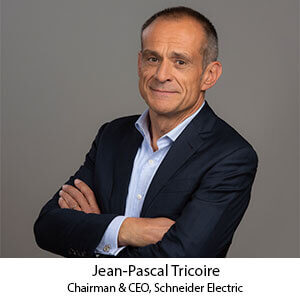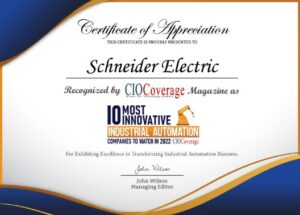 Schneider Electric SE is a multinational French company that provides digital energy and automation solutions for efficiency and sustainability. It integrates energy technologies, real-time automation, software, and services to provide sustainable and effective solutions to homes, buildings, data centers, infrastructure, and industries.
Schneider Electric SE is a multinational French company that provides digital energy and automation solutions for efficiency and sustainability. It integrates energy technologies, real-time automation, software, and services to provide sustainable and effective solutions to homes, buildings, data centers, infrastructure, and industries.
In May 2018, L&T sold its electrical and automation (E&A) business to Schneider Electric to focus on growth areas. Schneider merged it with Schneider Electric India’s Low Voltage and Industrial Automation Product business to form Schneider Electric India Private Limited (SEIPL), of which Schneider Electric owns 65 percent and Temasek owns the remaining stake. Last September, the merger was completed. It will keep certain L&T brands, such as switch gears, for another five years.
Schneider Electric’s mission is to enable everyone to make the most of their energy and resources, bridging progress and sustainability for everyone. This is referred to as “Life Is On.” The vision is to be the world’s most trusted digital partner for sustainability and efficiency.
Schneider & Cie was established in 1836. In May 1999, it was renamed Schneider Electric. Schneider Electric is a Fortune Global 500 company that is publicly traded on the Euronext Exchange and a component of the Euro Stoxx 50 index. The company made €25.2 billion in revenue in fiscal 2020. Aside from being a research firm, Schneider Electric is also the parent company of Square D, APC, and others.
Schneider Electric India stands out as an automation control and solutions provider due to its extensive and diverse global experience. Schneider Electric’s name is synonymous with a global standard of expertise, knowledge, and performance in the field of industrial automation.
The Industrial Internet of Things or IIoT is also known as smart manufacturing, digital factory, digital plant, connected industry, Industry 4.0, and intuitive industries. Whatever one chooses to call this disruptive industry transformation, it provides improved productivity, efficiency, sustainability, and cybersecurity across both new and legacy manufacturing facilities by leveraging the power of sensors, secure connectivity, and an IIoT platform.
The Industrial Internet of Things (IIoT) has created enormous opportunities for industrial customers to become more responsive, connected, and efficient. A reported $14 trillion in new business growth is available – and a goal of improved business performance can help an organization get its fair share of that growth.
Several companies and industry owners use a variety of digital technologies to ensure that industrial sites run smoothly and efficiently. Because automation tools and instruments are designed to replace human labor with a wide range of software and devices, the idea of integrating industrial automation products and systems significantly helps the company save costs. Furthermore, industrial automation products and solutions promise optimal product quality, improved information accuracy, and increased flexibility, all of which help generate massive amounts of revenue. Enclosures and accessories, contractors and protection relays, Human Machine Interfaces, method instrumentation, remote SCADA and telemetry systems, and other industrial product categories are available from Schneider Electric India.
Industrial automation is the use of control systems to run various machines and processes to increase overall efficiency and reduce human effort. As the name implies, industrial automation is commonly used in a variety of industries such as pharmaceutical, construction, computer, and others. As a result, industrial automation products and solutions effectively reduce expenses and labour costs, boost productivity, deliver products, and improve product consistency.

Schneider Electric, named the world’s most sustainable corporation by Corporate Knights in 2021, has committed to saving and avoiding 800 million metric tonnes of CO2 for customers by 2025, as well as assisting 1,000 of its suppliers in significantly reducing their carbon emissions by 2025. Supply chains are frequently the largest contributor to an organization’s carbon footprint. To contribute to India’s sustainability goals, Schneider Electric have launched the ‘Green Yodha’ programme, which will assist citizens and businesses, particularly small and medium-sized enterprises (SMEs), in reducing their carbon footprint through the adoption of energy-efficient practices.
“Schneider Electric sees a future of zero, zero waste, zero emissions, and a zero-carbon future is within our grasp. Much of the technology and methods to get us there already exist. What we need now is the collective commitment from all to take the next step, whether it’s their first, second or hundredth on the path to sustainability.” says Jean-Pascal Tricoire, Chairman & CEO
Plant operators can benefit from the Industrial Internet of Things by utilising modern process drives such as Schneider Electric’s Altivar Process variable speed drives (VSDs) (IIoT). These drives collect and analyse data using the IIoT to assist businesses in optimising processes, managing energy consumption, and minimising costly asset downtime.
The IIoT operates not only at the machine or process level, but also at the device level, allowing it to be seamlessly connected to business systems and Internet data levels. The IIoT unifies analytics across a fleet of disparate assets in disparate geographies. It aggregates data and seamlessly provides analytics at the cloud level, enabling the construction of digitalized smart factories and increasing responsiveness. Cybersecurity has emerged as a barrier to the IIoT’s implementation.
Schneider Electric follows industry best practices when developing and implementing control systems. This includes employing a “Defense-in-Depth” strategy to safeguard an Industrial Control System. This method places the controllers behind one or more firewalls, limiting access to only authorized personnel and protocols.
As the world digitalizes at an alarming rate, industries in a variety of sectors are turning to industrial automation. The use of control systems, such as information technologies, robots, and tools, for handling various types of machinery and processes used in various industries is referred to as industrial automation products.
Automation products are important because they effectively reduce production costs while improving product quality, resulting in higher profits. Industrial automation is a result of digitalization, which has greatly improved the industrial sector. It improves process efficiency by utilizing robots, computers, and other control systems to supervise a variety of intricate tasks. Industrial automation reduces costs, increases productivity, improves communication, improves equipment supervision, and expands the scope of traceability.
EcoStruxure, Schneider Electric’s next-generation smart platform, is widely used in home and building automation, industry, mobility, and energy management solutions. The EcoStruxure platform is IoT-enabled, plug-and-play, open, and has an interoperable software-based architecture to help customers achieve their sustainability and energy-efficiency objectives. All of its products are designed with an eco-friendly approach in mind, allowing them to be easily repaired, upgraded, and finally dismantled at the end of their useful life. The “Ecofit” services make equipment upgrades easier by replacing only key components rather than the entire system






